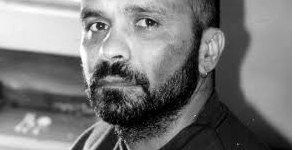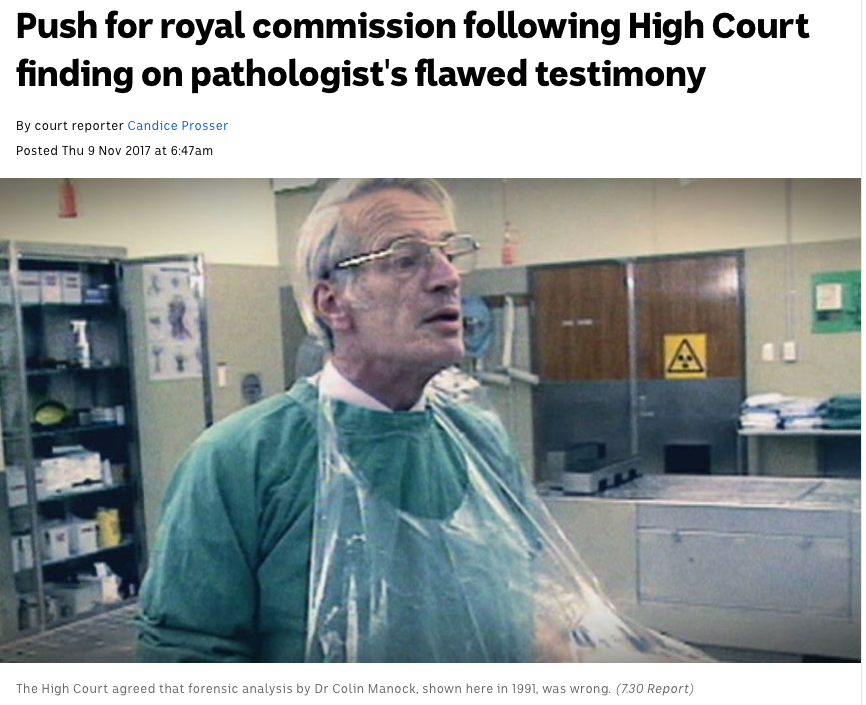Andrew L. Urban.
British author, journalist, and a consultant in forensic evidence, Satish C. Sekar, believes it is “only a question of time before a special inquiry is established” into the trail of unsafe forensic reports generated by Dr Colin Manock over his decades long tenure as Chief Forensic Pathologist in South Australia, not least the case of Derek Bromley, still in jail after 37 years. In a letter to the SA Attorney General Vickie Chapman, Sekar urges a proactive approach, echoing earlier calls.
Giving explosive evidence before the Budget & Finance Committee of the South Australian Legislative Council (November 5, 2018), legal academic Dr Bob Moles outlined why he believes a Royal Commission is needed into the State’s several failures in allowing the unqualified and discredited forensic pathologist Dr Colin Manock to continue his work – unchecked for decades.
Dr Moles and I submitted to SA Attorney General The Hon Vickie Chapman that the State had to address Dr Manock’s legacy of forensic malpractice. (Manock is retired.) For one thing, convictions based on his work were all clearly unsafe. Those convicted have a right to be assured or relieved…. legally and morally. Many will have served their time, but the convictions remain on the record. Some may well have died, some will still be in prison, perhaps. (As Bromley is.
Our correspondence in 2018-19 included argument that being pro-active in the matter and tackling the issue head on would be in the public interest as well as politically advisable.
Chapman concluded the correspondence thus (19 February, 2019): “I do not consider that investigation of the many cases in which Dr Colin Manock conducted pathology work over many years is necessary or that the associated expenditure of public funds would be justified. I reiterate that any concerns arising from Dr Manock’s conduct or evidence will be appropriately dealt with on a case by case basis.”
In other words, it has been left up to the convicted and/or their families to begin proceedings to request a review of Dr Manock’s evidence. Individually.
 Briefing: Derek Bromley was convicted of murder in 1984. It was said that he assaulted a person and drowned him in the river in Adelaide. The most recent appeal court was provided with three expert reports on the forensic pathology evidence given by Dr Manock. All the experts agreed that the diagnosis of death by drowning was wrong. The eye witness who testified at trial was known to be psychotic and suffering from hallucinations and delusions on the night of the incident. The Crown told the jury that this did not necessarily make the evidence of his observations implicating Bromley unreliable. The appeal was unsuccessful.
Briefing: Derek Bromley was convicted of murder in 1984. It was said that he assaulted a person and drowned him in the river in Adelaide. The most recent appeal court was provided with three expert reports on the forensic pathology evidence given by Dr Manock. All the experts agreed that the diagnosis of death by drowning was wrong. The eye witness who testified at trial was known to be psychotic and suffering from hallucinations and delusions on the night of the incident. The Crown told the jury that this did not necessarily make the evidence of his observations implicating Bromley unreliable. The appeal was unsuccessful.
Excerpts from Sekar’s letter:
(Sekar writes that his letter of December 5, 2020 follows a series of conference sessions – on Zoom – on issues of wrongful convictions, in which the participants from various countries “were particularly disturbed to learn …. of the issues arising from the South Australian experience with Dr Manock.”)
If on the application for leave to appeal to the High Court, the prosecution acts in accordance with its duty of disclosure ‘to the court’, it would be obliged to disclose that Dr Manock was not in fact an expert when he purported to give expert opinion evidence at Mr Bromley’s trial, and therefore his evidence should not have been admitted. If that is so, then there can be no doubt that the false and misleading evidence of Dr Manock as to his status (that he was an expert) constituted an appealable error, and the appeal would have to be allowed. The fact that Mr Bromley’s counsel chose to withdraw that issue from the consideration of the court on the appeal does not obviate the necessity of the prosecution to fulfil their duty of disclosure to the court on this issue.
 … there has never been any previous case (in Australia, the UK, Canada or the USA) in which an expert of Dr Manock’s apparent standing has been identified in formal legal proceedings as incompetent and unqualified and then continued to be used by the state in criminal proceedings without the court being informed of those deficiencies
… there has never been any previous case (in Australia, the UK, Canada or the USA) in which an expert of Dr Manock’s apparent standing has been identified in formal legal proceedings as incompetent and unqualified and then continued to be used by the state in criminal proceedings without the court being informed of those deficiencies
The suggestion that the police and prosecuting authorities in South Australia can take charge of this issue clearly represents the clearest possible conflict of interest. It is those authorities who have used the evidence of Dr Manock to secure hundreds of convictions over the years in circumstances where it was clearly inappropriate to do so.
It is self-evident that in the case of Dr Manock, proper procedures have not been followed and the question of the outcomes in 10,000 autopsies and over 400 criminal convictions have been brought into question. Given the growing international interest in this issue, it is in my view only a question of time before a special inquiry is established. No doubt the overturning of the conviction of Mr Bromley will provide a powerful stimulus to that, whether through the shortened appeal procedure or the more-lengthy High Court procedure.
The overturning of the Bromley conviction after he has served over 37 years in prison will establish a new record for the length of time served prior to the recognition of a wrongful conviction in Australia, Britain and Canada. Given that he is indigenous, and that the evidence given at his trial was so evidently suspect, even at that time, I have little doubt that the legal institutions in Australia will need to demonstrate a significant commitment to resolving the issues of wrongful convictions as has occurred in both the UK and Canada.
It is clearly important to maintain public confidence in the rule of law and in our institutions of justice. The head of the World Bank recently said that confidence in the rule of law was one of the key factors in maintaining confidence in our economic systems. The rule of law in South Australia is in my view in the process of undergoing a serious challenge and as yet, there are no signs of an effective response to that challenge. As the most senior law officer in South Australia, I respectfully request that you consider addressing these issues in a proactive manner, and that you consider obtaining independent advice as to the best means for their resolution.

After the Zoom sessions exposed to interested people all over the world the shame of South Australia trying to avoid doing anything about the Manock scandal, I imagine that Australia is becoming more of an international disgrace, in the eyes of the experts from overseas.
With Australia’s reputation as a fair-minded country at risk, which would contribute to such things as downgraded ratings of our country …..
Is this more of a National issue than a State issue?
Is there any National body in Australia that has jurisdiction to do something about the scandal in three States – Tasmania (Sue Neill Fraser), South Australia (Dr Manock) and Western Australia (lack of investigation to find the real perpetrator in the Rayney and Austic miscarriages of justice, despite having plenty of leads)? In each State, the relevant authorities, such as the Attorney- General, seem to value more highly “avoiding a scandal” than “seeking justice”.
Instead of writing to the AG in each State, who (in Tas and SA’s cases) have failed to act, is there some federal authority who can act?
Should we be pursuing a National Criminal Cases Review Commission, rather than trying to have one in each State?
Of course. Dr Bob Moles has outlined how that can be done in a letter to AG Porter, quite simply. But it takes political will. And a bit of courage to stand up to a legal fraternity that has largely ignored this issue. Those few in the profession who support the idea are overwhelmed by the many who just don’t care.
Australia’s reputation as a fair-minded country has a rather tragic ring to it as in recent decades we have been in decline both intellectually and ethically.
My impression is that many foreign countries see us as spoiled and immature but in return we see them as inferior because of their underprivileged circumstances.
We also drool over sport as though it is the holy grail of personal and national prestige even as we interview sporting personalities in the media with the respect we reserve for important people. Muhammad Ali once said “most boxers can’t even talk” which has a general application I think.
In these very discourses it has been mentioned that the stress placed on “winning” is to the forefront despite the presence of blatant immorality. If you cheat and get away with it then you did not cheat. You merely won!
… there has never been any previous case (in Australia, the UK, Canada or the USA) in which an expert of Dr Manock’s apparent standing has been identified in formal legal proceedings as incompetent and unqualified and then continued to be used by the state in criminal proceedings without the court being informed of those deficiencies
Every time I now appear at a trial in WA involving medical evidence, where the doctor does not appear to have the appropriate qualifications to give “expert” evidence, I object. A recent trial involved a former dentist who is now in his third year of a traineeship to be a specialist. Then I give chapter and verse on the perils of allowing the doctor to give evidence given the longstanding Manock travesty in SA. The judge in that matter overruled my objection, and in fact later lauded the doctor in her charge.